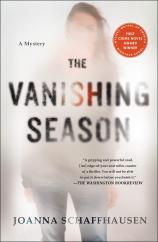The Vanishing Season
Review
The Vanishing Season
As a teenager, Abby Hathaway survived a brutal kidnapping at the hands of serial killer Francis Michael Coben. Fourteen years later, she has dropped Abby for her middle name of Ellery and is working as a police officer in Woodbury, Massachusetts. She has tried hard to put the trauma behind her; no one in her new life knows the truth about what happened to her as a child. But when people start to disappear from her adopted hometown, always around the anniversary of her own abduction, she begins to suspect a connection to her past. With her superiors deaf to her warnings as another “vanishing season” begins, Ellery turns to the only person she thinks might be able to help: Reed Markham, the now-disgraced FBI agent who rescued her from Coben.
Joanna Schaffhausen won the 2015 Minotaur Books/Mystery Writers of America First Novel Competition for her gritty and gripping debut, and it’s easy to see why the judges warmed to the book. THE VANISHING SEASON has a sharply drawn heroine, a number of creatively grisly crimes, and a twisty, creepy mystery at its center. It’s not clear what’s more disturbing --- that Ellery and Reed might be dealing with a demented copycat killer, or the possibility that Coben himself is orchestrating the crimes from his cell in federal prison.
"THE VANISHING SEASON has a sharply drawn heroine, a number of creatively grisly crimes, and a twisty, creepy mystery at its center."
As Ellery and Reed embark on their investigation, they encounter no shortage of possible suspects. In addition to Coben himself, could the killer be the married police chief with whom Ellery is having an affair, or perhaps his disgruntled wife? What about the irritatingly confident detective who’s in charge of investigating the missing persons cases, or the mild-mannered vet tech who’s Ellery’s only friend? Even Ellery herself is under a cloud of suspicion, with Reed wondering if the trauma she faced as a child could have triggered a mental break.
Savvy readers will spot the likely killer early on, though that doesn’t necessarily take away from the pleasure of watching Ellery and Reed work together (sometimes at cross-purposes) to figure it out on their own. More difficult to swallow are some of Ellery’s actions. She supposedly is desperate to break free from her old life and keeps the truth about her identity hidden from everyone in Woodbury. But she never seems to have considered legally changing her name, thus making it absurdly easy for the media (not to mention murderers) to track her down. When a persistent reporter finally shows up on Ellery’s doorstep to question her about her connection to Coben, the only surprise is that she didn’t get there sooner.
Some clunky writing also marks this as the work of a beginner. When Reed asks Ellery if she was “raised in a barn,” the question understandably discombobulates her --- when Coben kidnapped her, he kept her locked in a barn. But it would be enough to have her drop the plates she’s carrying in shock; to have Reed then remember “with horror what had happened to her in a barn” betrays a lack of faith in the reader’s ability to recall key details of the story. The final confrontation between the killer and Ellery also feels rushed, as if once Schaffhausen had arranged all her pieces on the chessboard, she wasn’t quite sure what to do with them.
While some aspects of the book don’t quite jell, there’s much about THE VANISHING SEASON that works well, from the banter about ’80s pop hits to Ellery’s poignant meditations on how her kidnapping has shaped her life. As a survivor, she’s supposed to be the lucky one, the girl who got away. The reality is a bit more complicated, “one part miracle, one part waking nightmare,” as Ellery puts it. She and Reed share a fraught, complex history, with both of their lives determined by the actions of one deranged man. Breaking the Coben case made Reed’s career and made him famous, but celebrity came at a price. Meanwhile, Ellery lost her innocence and any chance at a life free of fear and nagging distrust.
By telling both their stories, Schaffhausen, a former writer for television news programs like “20/20,”plays to our desire to know all the gory details of a crime, while also suggesting that there’s something unseemly in our desire to gawk at the wreckage. That tension gives THE VANISHING SEASON a moral weight it might otherwise lack, and suggests that this writer’s best work might be yet to come.
Reviewed by Megan Elliott on December 8, 2017




